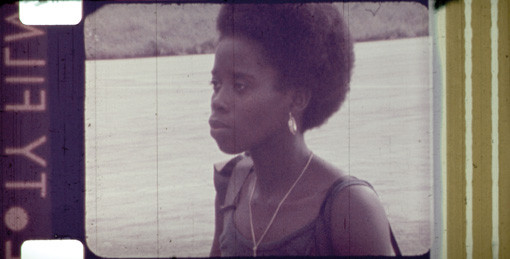Filipa César
16 Oct 2012 - 20 Jan 2013

Josefina Crato dans O Regresso de Amílcar Cabral (Le Retour d’Amílcar Cabral)
1976
Josefina Crato in O Regresso de Amílcar Cabral (The Return of Amílcar Cabral), 1976.
© INCA Guinée-Bissau, José Bolama Cobumba, Josefina Crato, Flora Gomes, Sana na N’Hada
1976
Josefina Crato in O Regresso de Amílcar Cabral (The Return of Amílcar Cabral), 1976.
© INCA Guinée-Bissau, José Bolama Cobumba, Josefina Crato, Flora Gomes, Sana na N’Hada
FILIPA CÉSAR
Luta ca caba inda (The struggle is not over yet)
Satellite 5 / Curator: Filipa Oliveira
16 October 2012 - 20 January 2013
“Luta ca caba inda“ (The struggle is not over yet) is as stage from a research project initiated in 2008, but Filipa César’s interest in Guinea-Bissau goes back to an early age and is closely associated with her father’s past. In her first trips to Guinea, César began to unravel the origin of cinema in this West-African country and specially the existence of a cinematic archive, which was in a very derelict state due to both the difficult atmospheric conditions and to the ongoing political instability of the country.
The history of cinema in Guinea Bissau starts during the War for Independence with Portugal (1963-1974) with Amilcar Cabral, the revolutionary leader, sending four young guineanses to the Cuban Film Institute (ICAIC) to learn how to make cinema. For Cabral, cinema was a way of education and of bring the more then 40 ethnic groups to know each other and join the same aim - Independance. Far from cheap propaganda, it was a strategy to make them aware the struggle, of his revolutionary ideals and taking at the same time the power of one’s own image in order to visually create a new national identity. Cinema was a political tool, a way to create a new collective memory, to write history of the new liberated Guinea with another empowered voice.
The exhibition at the Jeu de Paume is the first stage of her attempt to animate this archive, to continue a struggle that is not over yet. Instead of a historical, archival exhibition César wants the spectator together with her to consider how to think these images assembling facts and fictions, personal narratives and collaborations, “Luta ca caba inda” (The struggle is not over yet) a title appropriated from an unfinished film from the end of 1970’s, included in this corpus, is poetical visual essay about the struggle implied in the act of accessing this images from another time.
Filipa César, Portuguese, born in 1975, lives in Berlin.
Luta ca caba inda (The struggle is not over yet)
Satellite 5 / Curator: Filipa Oliveira
16 October 2012 - 20 January 2013
“Luta ca caba inda“ (The struggle is not over yet) is as stage from a research project initiated in 2008, but Filipa César’s interest in Guinea-Bissau goes back to an early age and is closely associated with her father’s past. In her first trips to Guinea, César began to unravel the origin of cinema in this West-African country and specially the existence of a cinematic archive, which was in a very derelict state due to both the difficult atmospheric conditions and to the ongoing political instability of the country.
The history of cinema in Guinea Bissau starts during the War for Independence with Portugal (1963-1974) with Amilcar Cabral, the revolutionary leader, sending four young guineanses to the Cuban Film Institute (ICAIC) to learn how to make cinema. For Cabral, cinema was a way of education and of bring the more then 40 ethnic groups to know each other and join the same aim - Independance. Far from cheap propaganda, it was a strategy to make them aware the struggle, of his revolutionary ideals and taking at the same time the power of one’s own image in order to visually create a new national identity. Cinema was a political tool, a way to create a new collective memory, to write history of the new liberated Guinea with another empowered voice.
The exhibition at the Jeu de Paume is the first stage of her attempt to animate this archive, to continue a struggle that is not over yet. Instead of a historical, archival exhibition César wants the spectator together with her to consider how to think these images assembling facts and fictions, personal narratives and collaborations, “Luta ca caba inda” (The struggle is not over yet) a title appropriated from an unfinished film from the end of 1970’s, included in this corpus, is poetical visual essay about the struggle implied in the act of accessing this images from another time.
Filipa César, Portuguese, born in 1975, lives in Berlin.
